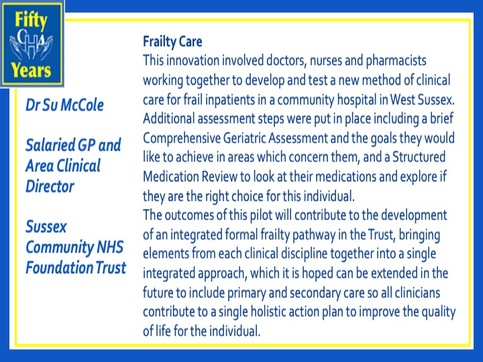Frailty Care
Dr Su McCole
Salaried GP and Area Clinical Director
Sussex Community NHS Foundation Trust
Summary:
This innovation involved doctors, nurses and pharmacists working together to develop and test a new method of clinical care for frail inpatients in a community hospital in West Sussex.
In addition to the standard medical and medicines management care, additional steps were designed and taken, and the effectiveness evaluated, within a Quality Improvement project.
These steps were a brief Comprehensive Geriatric Assessment to explore in greater depth and breadth the impact of frailty upon the individual’s quality of life, and the goals they would like to achieve in areas which concern them, and a Structured Medication Review to look at their medications and explore if they are the right choice for this individual.
The outcomes of this pilot will contribute to the development of an integrated formal frailty pathway in the Trust, bringing elements from each clinical discipline together into a single integrated approach, which it is hoped can be extended in the future to include primary and secondary care so all clinicians contribute to a single holistic action plan to improve the quality of life for the individual.
It is also hoped such integrated working will also strengthen joined up working around the transfer of care between services and teams.
This links to a national focus on SMR for frailty in primary care and to the NHSE vision of integrated care
Background:
Emma Finlay is an Advanced Nurse Practitioner and is completing a post-graduate qualification involving reflection on the clinical care of frail patients. She was discussing this with Su McCole, the Area Clinical Director and a ward GP, and they agreed on a Quality Improvement (QI) project which could explore new approaches to the initial assessment (clerking) of patients who are admitted to the community hospitals.
On further exploration around the evidence of best practice for the care of frailty, it was brought to their attention that a medication review can bring great benefits to the patients. They approached the Principal Clinical Pharmacist within the Trust leading on frailty for the medicines management team, Karen Varisco, and together they devised a QI project for frail adult inpatients with two arms – the first to test the benefits of using a brief version of the Comprehensive Geriatric Assessment (CGA) to ensure a holistic conversation about the patient’s needs and goals, and secondly to test the benefits of a structured medication review (SMR), and explore which tools are most helpful to achieve this.
The existing ward clinical pharmacy service includes medicines reconciliation and a safety check of all medication prescribed. We wanted to pilot extending this service to include SMR for frailty.
The CGA and SMR pilot will contribute to the development of a formal frailty pathway in the Trust and strengthen MDT working on transfer of care. This links to a national focus on SMR for frailty in primary care.
Description:
A QI project was devised: during October, new admissions to Arundel would be briefly assessed for suitability. Those who were admitted with one of the 5 frailty syndromes (clinical conditions highly likely to indicate the presence of frailty) would be included in the project, as long as they had capacity to consent and participate.
They would have their Rockwood Clinical Frailty Scores calculated, and if the score was 4-6 (mild to moderate frailty) they would proceed to the next step.
They would be clerked in the normal way, but Emma would then check the brief CGA checklist to ensure she had discussed all the recognised aspects of quality of life that can be hindered by frailty. She would identify, for each patient, their key issues, and the goals the patient wanted to achieve in those areas, and the actions that would be taken to achieve them.
These patients would also be seen by a Senior Clinical Pharmacist who is very experienced in structured medication reviews (SMRs).
The Pharmacist would carry out a medication review where needed, and reflect upon whether this could have been done by a more junior colleague and if so, which tools they would have needed to prioritise suitable patients and then perform SMR. Ten patients, as a minimum, will be included.
The goals are:
- to test the usefulness of the brief CGA tool and decide whether it should be added to routine practice
- to identify the characteristics of patients who would benefit from a SMR whilst an inpatient
- to identify which tools would support clinical pharmacists to carry out SMRs on frail inpatients
- to identify next steps, potentially including how to prioritise limited resources to offer these additional assessments
For further information contact: [email protected]


